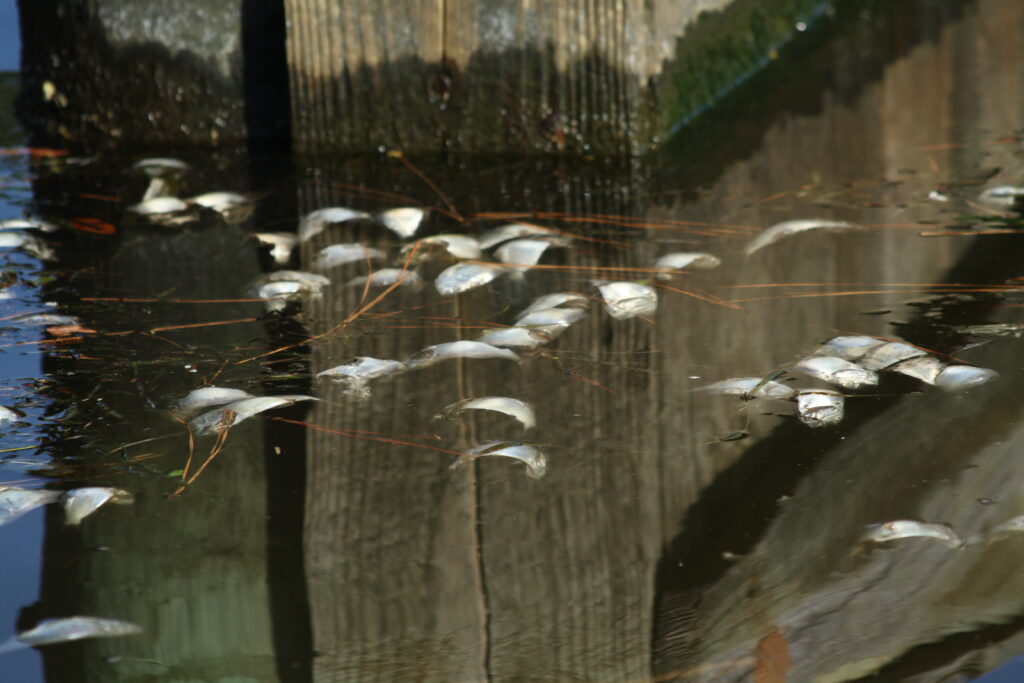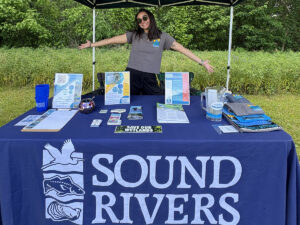News
Excessive heat may lead to fish kills
Algal Blooms, Climate Change, Environmental, Fish Kills, Neuse River Watershed, Sound Rivers, Stormwater Runoff, Tar-Pamlico Watershed, Water Quality
Posted on August 17th, 2023
*update Aug. 24: in the week since this was posted, Sound Rivers has received numerous complaints of fish kills on the lower Neuse and Pamlico rivers and their tributaries.
The Neuse and Tar-Pamlico rivers, and their tributaries, have certainly seen their share of fish kills over the past several decades, and this summer’s sweltering heat in eastern North Carolina (and around the world!) may be providing the ideal circumstances for more.
It’s that time of year — this week, a fish kill was reported at Blounts Bay on the Pamlico River, and Sound Rivers staff think there may be more on the way.
U.S. Geological Survey breaks down how and why fish kills happen with this explanation:
“Many, but not all, fish kills in the summer result from low concentrations of dissolved oxygen in the water. Fish, like all other complex life forms, need oxygen to survive. They get theirs in the form of oxygen gas dissolved in the water. That’s why it’s important to have an aeration device, a bubbler, in your home aquarium.
“Warm water holds less dissolved oxygen than cold water, so summer is the time when fish can have a hard time getting enough oxygen. Other organisms use oxygen, too, including the algae that grow in the summer and bacteria that degrade organic matter. During the day, the algae produce oxygen through photosynthesis, but at night, when photosynthesis stops, they and other organisms keep respiring, using up oxygen.
“So, on warm summer nights during algal blooms, the dissolved-oxygen concentration sometimes drops too low for the fish, and a die-off can occur. This can occur as a result of purely natural conditions or because of human activity that results in adding nutrients, nitrogen and phosphorous, to water systems. Nutrients come from many sources: fertilizers, automobiles, sewage, manure and others. An excess of nutrients tends to speed up the growth of algae and diminish the availability of dissolved oxygen.”
Sudden rain after a dry spell (which we’ve had nearly all summer long) can wash excessive nutrients into the waterways.
So, be on the lookout for fish kills. Report a fish kills through our website, shoot us an email or tag us on social media with the location of the fish kill, and we’ll make sure the North Carolina Department of Environmental Quality gets that information. You can also report and track fish kills on the NCDEQ website.
Related News

Swim Guide volunteers needed!
May 8th 2025

Riverkeeper hops watersheds to share Sound Rivers mission
May 8th 2025

Riverkeeper reacts to Lake Crabtree Park closure
May 8th 2025

Girl Scouts take on Jack’s Creek
May 8th 2025

Durham council approves Howard property development
May 8th 2025

Adkin Branch tour a precursor to watershed restoration plan
May 8th 2025

Sound Rivers loses AmeriCorps staff member
May 8th 2025

Students swept away by ‘Stormwater Week’
May 1st 2025

